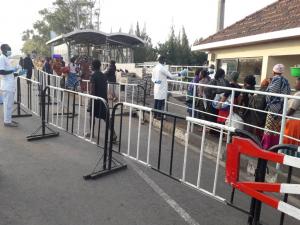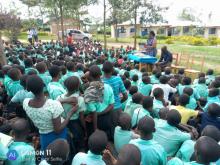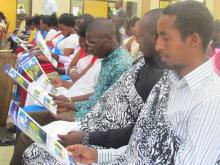Reminder to strengthen measures to prevent the spread of Ebola Virus to Rwanda
The Ebola Virus Disease was confirmed on July 14, 2019 in Goma, North Kivu Province in the Democratic Republic of Congo by its Ministry of Health.
The Ministry requests the population to remain calm as no single Ebola case has been registered in Rwanda to date. The Country is taking the outbreak in the neighbouring countries seriously and continues to intensify the surveillance at all ports of entry as well at the community level.
However, the Ministry strongly reminds everyone to seriously consider the following preventive measures:
• avoid unnecessary travels to areas affected by an Ebola outbreak;
• immediately report to the nearest screening station if you are coming from an Ebola affected area;
• report any suspected case of Ebola via the Ministry toll free number 114, Police on 112, Community Health Workers or to any nearest health facility;
• in case you know someone who is from an Ebola-affected area, immediately report to the Police on 112, to the Ministry of Health on 114, to the nearest local authorities or Community Health Workers;
• avoid contact with blood and body fluids, items that may have come in contact with an infected person’s blood or body fluids;
• avoid contact with body of an Ebola victim and/or meat from an unknown source;
• advise every person who has been in contact with a patient with Ebola symptoms or who attended a burial ceremony of a known case of Ebola to immediately report to the nearest health facility for urgent medical attention;
• always wash hands with soap and clean water.
Ebola is transmitted through an infected person’s body fluids like blood, vomit, sweat, tears, saliva, urine, excrement, sperm, breast milk, vaginal fluids etc.
Ebola symptoms include fever, joint pain, headache, sore throat, fatigue, diarrhoea, vomiting, skin rash, red eyes, stomach ache and bleeding through different body parts. Ebola is not airborne.
All concerned stakeholders including the general public, local authorities, media houses, civil society, private sector such as local and regional transport companies and hotels to combine efforts to ensure that the disease does not spread to Rwanda.
Screening is being performed on all boarders and airports and the country is equipped with an Emergency Treatment Center (ETC) built in Rugerero Sector, Rubavu District to screen and treat Ebola in case of an outbreak. Simulation exercises took place in Gisenyi Hospital-Rubavu District, Rwanda Military Hospital-Kigali, Rugerero Health Centre-Rubavu and Kamembe Airport-Rusizi.
In partnership with WHO, The Ministry of Health for DRC and other partners, the Ministry of Health continues to strengthen the national capacity for early detection and containment in the event a case spreads into Rwanda. Rwanda has trained over 23,657 people including Doctors, nurses, hospital staff, Police, Red Cross Volunteers and Community Health Workers. The Ministry also vaccinated about 3,000 healthcare providers and other frontline workers (safe burial teams, security guards and cleaners) in 15 high risk districts.
The Rwanda capacity in controlling Ebola also include the robust community awareness and mobilization, logistics, Ebola Treatment Center, establishment Ebola related work force development and capacity building in case management, infection prevention and control, contact tracing teams, burial teams, psycho-social teams and surveillance with national capacity to detect/test any suspected case identified in the country.
Public awareness and community mobilization are still ongoing on Ebola symptoms, prevention measures and steps to follow if an Ebola case is suspected though community meetings, outreach events and media. Billboards and posters with information on Ebola are hung at border areas, in hotels, schools, hospitals, health centres and other public places in high risk zones.





